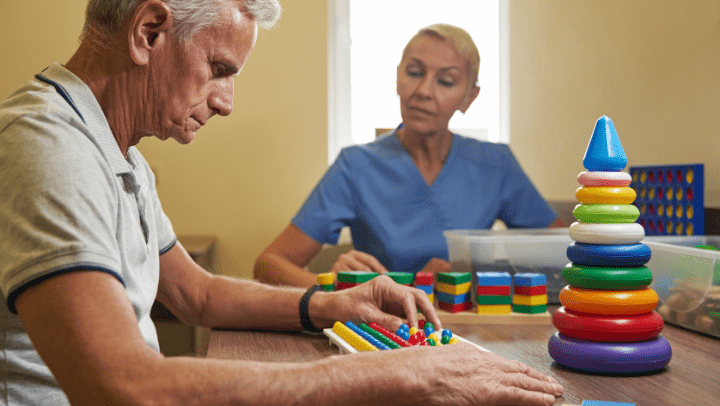September 23, 2024
Boost Your Brainpower: Effective Cognitive Exercises for Retirees to Stay Mentally Sharp in Pasadena, CA

The Importance of Cognitive Exercises for Retirees
Retirement marks a significant life chapter filled with both promise and challenges. A crucial aspect of thriving during this phase is safeguarding cognitive health and maintaining mental sharpness.
As we age, our brain’s ability to learn, remember, and solve problems can gradually decline. However, engaging in cognitive exercises can help counteract this natural process. These activities stimulate the brain, enhancing memory, attention, problem-solving, and critical thinking skills. By incorporating brain workouts into your daily routine, you can boost your brain’s resilience, improve cognitive function, and enrich your overall well-being in retirement.
Understanding Memory Care and Its Benefits
Memory care in Pasadena, CA, provides specialized support for individuals experiencing cognitive challenges, such as Alzheimer’s or dementia. While often associated with advanced stages of the disease, these programs can also benefit retirees seeking to proactively protect their mental health and potentially stave off cognitive decline.
- Personalized cognitive assessments and tailored care plans
- Structured cognitive stimulation activities, such as puzzles, memory games, and brain teasers
- Group activities that encourage social interaction and collaboration
- Nutritional guidance and support to optimize brain health
Common Cognitive Exercises for Retirees
- Brain Teasers and Puzzles: Activities like crossword puzzles, Sudoku, jigsaw puzzles, and logic games can challenge your problem-solving skills and stimulate your brain.
- Memory Games: Memory-based games, such as matching games, card games, and recall exercises, can help improve short-term and long-term memory.
- Language Learning: Learning a new language, whether it’s through an online course, a local community class, or a language-learning app, can enhance your cognitive flexibility and language processing abilities.
- Physical Exercise: Regular physical activity like walking, swimming, or yoga enhances cognitive function and overall brain health.
- Socialization: Maintaining an active social life, whether through group activities, volunteering, or regular meetups with friends and family, can help prevent social isolation and stimulate cognitive engagement.
Incorporating Cognitive Exercises into Daily Routines
Keep your mind sharp in retirement with daily cognitive exercises. Here’s how to start:
- Allocate Dedicated Time: Dedicate 15-30 minutes daily to cognitive activities.
- Mix It Up: Avoid doing the same cognitive exercises every day. Rotate through different activities to challenge your brain in various ways and prevent boredom.
- Make It Enjoyable: Choose cognitive exercises that are genuinely exciting and engaging. This will make it easier to stick to your routine and ensure you get the most out of your brain-boosting activities.
- Involve Others: Invite friends, family members, or fellow retirees to join you in your cognitive exercises. This can make the activities more enjoyable and provide opportunities for social interaction.

Tips for Staying Mentally Sharp in Retirement
In addition to incorporating cognitive exercises into your daily routine, there are other lifestyle factors that can enhance your brain health and keep you mentally sharp in retirement:
- Maintain a Healthy Diet: Eat a balanced diet rich in fruits, vegetables, whole grains, and healthy fats, which can support brain function and reduce the risk of cognitive decline.
- Stay Physically Active: Physical activity, from gentle walks to energetic dances, boosts brain health by increasing blood flow and stimulating new cell growth.
- Get Enough Sleep: Sleep is essential for a sharp mind. Aim for 7-9 hours each night.
- Manage Stress: Employ meditation, mindfulness, or deep breathing to shield your brain from stress.
The Role of Community Support in Cognitive Health
Maintaining a strong social support network can also support cognitive health during retirement. Joining a local community center, senior center, or retirement community can provide opportunities for social engagement, group activities, and access to resources that can enhance your cognitive well-being.
By actively participating in your local community and taking advantage of these resources, you can not only maintain your cognitive abilities but also build a strong social support network that can enhance your overall quality of life in retirement.
Empower Your Mind: Nurturing Cognitive Health in Retirement
Maintaining cognitive health and mental sharpness is a critical aspect of a fulfilling retirement. By incorporating various cognitive exercises into your daily routine, understanding the benefits of memory care, and leveraging the support of your local community, you can proactively boost your brainpower and enjoy a mentally vibrant and engaged retirement.To learn more about memory care services and cognitive health resources in Pasadena, CA, contact our team of experts today at Villa Gardens. We can help you develop a personalized plan to keep your mind sharp and support your overall well-being in retirement; call us today at (626) 463-5300.
Read Our Front Porch Blogs

Front Porch Podcast – Episode 8: Belonging: The Heart of Community—with Arthur Liggins & Candace Young-Schult

Front Porch Podcast – Episode 7: Commander Beth Coye: A Warrior for Equality

